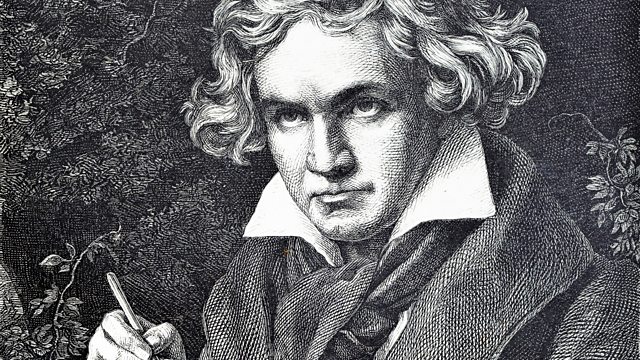
Beethoven meets Clementi
Donald Macleod looks at Beethoven's Fourth Piano Concerto and how the composer found a publisher in London.
Donald Macleod looks at Beethoven's Fourth Piano Concerto and how the composer found a publisher in London.
Composer of the Week explores Beethoven the pianist and composer for the piano. He became renowned in his day both as a virtuoso performer at the keyboard, and for his ground-breaking works for the instrument. When first starting out on his musical career, he greatly admired Mozart for his piano works, particularly the concertos. Beethoven sought out the older composer for lessons, although these never took place. Similar to Mozart's own career, Beethoven also made a name for himself initially not only as a composer, but as a pianist, and after Mozart's death was destined to take his place in Vienna as the leading composer there. From the outset, his works for the piano showed great skill and an independence of creative thought. In each programme this week, Donald Macleod explores one of Beethoven's five piano concertos, and the period in which it was written.
Countess Josephine had been a pupil of Beethoven's before her marriage to Count Joseph Deym. The count died in 1804, and what followed was a romantic entanglement between the grieving Countess and the composer. Ultimately nothing came of it for the Countess was concerned with the happiness and future of her family. If she had married Beethoven, a commoner, she'd have lost her title and the guardianship of her children. During this period of emotional turmoil Beethoven was working on his Fourth Piano Concerto. It was premiered in 1808 along with his Choral Fantasy for piano, choir and orchestra, and also his Fifth and Sixth Symphonies. Prior to this mammoth concert, in the spring of the previous year Beethoven met with the composer Muzio Clementi. Clementi was on a tour, and was keen to encounter Beethoven in order to negotiate taking on some of his works for publication. Clementi would publish amongst other things a symphony, a concerto and a set of quartets, bringing Beethoven's music to a new audience in London.
Six Ecossaises, WoO83
Jenő Jandó, piano
Piano Concerto No 4 in G major, Op 58
Alfred Brendel, piano
Vienna Philharmonic
Simon Rattle, conductor
Choral Fantasy in C minor for piano, choir and orchestra, Op 80
Maurizio Pollini, piano
Gabriele Lechner, soprano
Gretchen Eder, soprano
Elisabeth Mach, contralto
Jorge Pita, tenor
Andrea Esders, tenor
Gerhard Eder, bass
Chorus of the Vienna State Opera
Vienna Philharmonic
Claudio Abbado, conductor
Producer Luke Whitlock.
Last on
Music Played
-
![]()
Ludwig van Beethoven
6 Ecossaises Woo 83 For Piano
Performer: Jenő Jandó.- Beethoven: Bagatelles And Dances, Vol. 2.
- Naxos.
- 4.
-
![]()
Ludwig van Beethoven
Concerto No 4 in G major Op 58
Performer: Alfred Brendel. Orchestra: Vienna Philharmonic. Conductor: Sir Simon Rattle.- Beethoven: Piano Concertos Nos. 1-5 (complete).
- Philips.
- 4.
-
![]()
Ludwig van Beethoven
Fantasia in C minor Op 80
Performer: Vienna Philharmonic. Performer: Maurizio Pollini. Performer: Vienna State Opera Choir. Conductor: Claudio Abbado.- 5 Klavierkonzerte / Chorfantasie.
- DEUTSCHE GRAMMOP.
- 9.
Broadcasts
- Thu 18 Jan 2018 12:00����ý Radio 3
- Thu 18 Oct 2018 12:00����ý Radio 3
Beethoven Unleashed – the box set
What was really wrong with Beethoven?
Composers A to Z
Who knew? Five eye-opening stories from Composer of the Week
Five reasons why we love Parry's Jerusalem
What is the strange power of Jerusalem which makes strong men weep?
A man out of time – why Parry's music and ideas were at odds with his image...
The composer of Jerusalem was very far from the conservative figure his image suggests.
Composer Help Page
Find resources and contacts for composers from within the classical music industry.





